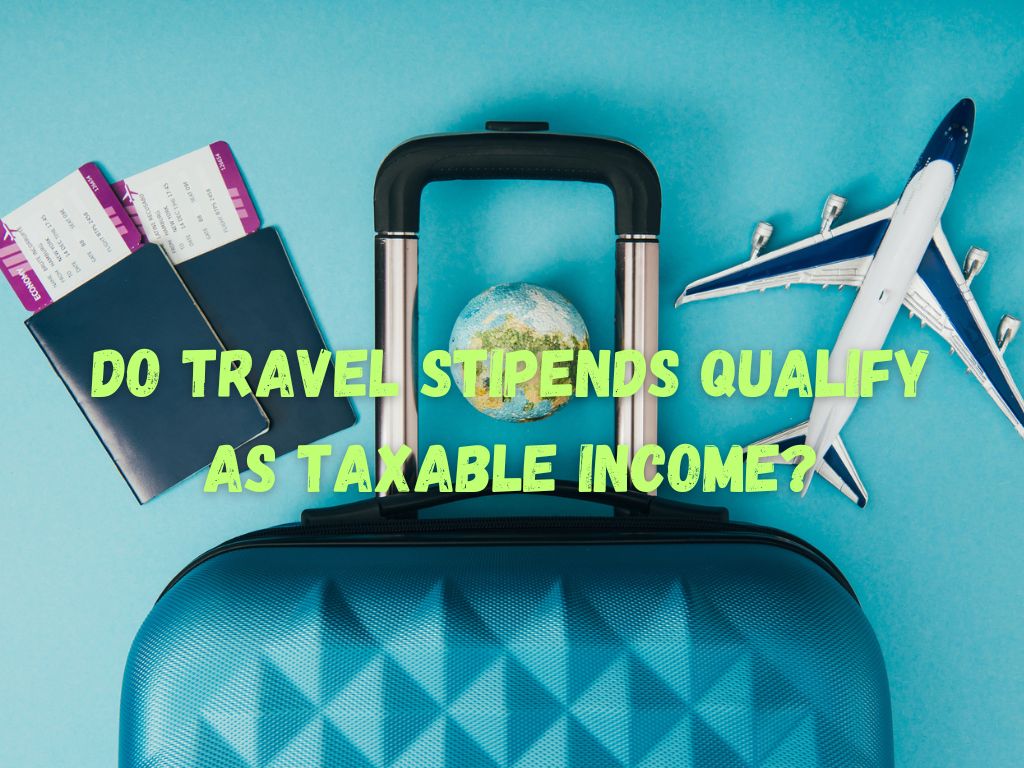Travel stipends have become an essential component of compensation packages for healthcare professionals, particularly for travel nurses.
These stipends are intended to cover expenses such as travel, accommodation, and meals associated with working in temporary assignments away from their homes.
However, when it comes to tax season, many professionals wonder whether these stipends qualify as taxable income or if they are considered tax-free reimbursements.
So, do travel stipends qualify as taxable income?
In this comprehensive guide, we will demystify the taxability of travel stipends, providing healthcare professionals with the essential information they need to comply with IRS regulations.
What are Travel Stipends?
Travel stipends are predetermined amounts of money paid to healthcare professionals to cover the costs of working in temporary assignments away from their homes.
These assignments may require professionals to relocate for a short duration, often ranging from a few weeks to several months.
It is important to note that travel stipends are not a form of additional income but are intended to reimburse professionals for the expenses incurred while temporarily living in a different location.

Do Travel Stipends Qualify as Taxable Income?
One of the biggest questions surrounding travel stipends is whether they are taxable income. According to IRS regulations, travel stipends can be either taxable or non-taxable, depending on various factors.
To determine the taxability of travel stipends, it is essential to differentiate between taxable income and non-taxable reimbursements.
Taxable Income vs. Non-taxable Stipends
Taxable income refers to any money received by an individual that is subject to income tax. On the other hand, non-taxable stipends are reimbursements that are not subject to income tax.
To qualify as non-taxable, travel stipends must meet certain requirements set by the IRS. These requirements are in place to ensure that the stipends are only used to cover legitimate business expenses.
One of the key factors is the existence of an accountable reimbursement plan, which ensures that professionals report all expenses and provide appropriate documentation.
Accountable Reimbursement Plan Requirements:
Professionals must adhere to the following requirements to qualify for tax-free stipends under an accountable reimbursement plan:
Business Connection: Travel stipends must be directly related to work conducted away from the professional’s tax home. They should cover legitimate business expenses incurred during temporary assignments.
Substantiation: Professionals must maintain accurate records of all travel expenses, including receipts, mileage logs, and other relevant documentation. Substantiating expenses is crucial to prove their legitimacy.
Return of Excess Funds: If professionals receive an advance or stipend amount greater than the actual expenses within a certain timeframe, they must return the excess funds to their employer or client. Failure to return excess funds could result in the stipend being considered taxable income.
Timely Reporting: Reimbursements should be made within a reasonable timeframe after the expenses are incurred. Timely reporting ensures that travel stipends remain non-taxable.
It is important to note that failing to meet any of these requirements can result in travel stipends being treated as taxable income.
Therefore, professionals should make sure to keep accurate records and follow the guidelines to maintain the non-taxable status of their stipends.

IRS Guidelines for Tax-Free Stipends
The IRS provides guidelines to determine whether travel stipends are considered taxable or non-taxable income.
One key factor is accountability. To be considered non-taxable, professionals must have an accountable reimbursement plan in place, which requires them to report all expenses and provide appropriate documentation.
Under an accountable reimbursement plan, the travel stipends received are considered reimbursements rather than income.
Examples of Taxable vs. Non-taxable Travel Stipends
To better understand how travel stipends are taxed, let’s consider a few examples.
Example 1: Taxable Stipend
Sarah, a travel nurse, receives a stipend of $3,000 for a three-month assignment. However, she fails to provide proper documentation and does not report her expenses. As a result, the entire stipend would be considered taxable income.
Example 2: Non-taxable Stipend
John, also a travel nurse, receives a stipend of $2,500 for a two-month assignment. He maintains an accountable reimbursement plan, diligently tracks his expenses, and provides the necessary documentation.
In this case, the stipend would be considered non-taxable, as it is treated as a reimbursement for legitimate business expenses.
Common Mistakes to Avoid
When reporting travel stipends as taxable income, several common mistakes should be avoided to prevent unnecessary tax problems.
By understanding and addressing these potential pitfalls, healthcare professionals can ensure compliance with IRS regulations and maximize their financial benefits.
Mistake 1: Insufficient Documentation
Maintaining proper documentation is critical when accounting for travel expenses. Professionals should keep receipts, invoices, and other supporting documents that provide evidence of legitimate business expenses.
Without adequate documentation, it becomes challenging to prove that the stipend was used for its intended purpose, potentially leading to tax implications.
Mistake 2: Inadequate Record-Keeping
Proper record-keeping goes hand in hand with maintaining sufficient documentation. It is vital to keep detailed records of expenses, including dates, descriptions, amounts, and proofs of payment.
This will help professionals accurately report their expenses and justify the non-taxable status of their stipends if audited by the IRS.
Mistake 3: Misunderstanding IRS Guidelines
To ensure compliance, healthcare professionals must have a solid understanding of IRS guidelines regarding the taxability of travel stipends.
Mistakes can arise if professionals misinterpret or are unaware of the requirements for non-taxable stipends. Seeking guidance from a tax professional who is well-versed in healthcare industry taxation can help prevent these errors.
Mistake 4: Failing to Return Excess Funds
If professionals receive more stipend funds than necessary for covering their expenses, it is crucial to return the excess amount within the specified timeframe.
Failure to do so may result in the entire stipend being considered taxable income, causing potential financial implications.

Tips for Filing Taxes as a Healthcare Professional with Travel Stipends
Navigating the tax implications of travel stipends can be complex, but with careful planning and adherence to IRS guidelines, healthcare professionals can file their taxes accurately and efficiently.
The following tips can simplify the tax filing process and help professionals maximize their financial benefits:
Tip 1: Consult with a Tax Professional
Consulting with a tax professional experienced in dealing with travel stipends and IRS regulations is highly recommended.
They can provide valuable advice tailored to healthcare professionals’ specific situations, ensuring compliance with tax laws and helping maximize deductions.
Tip 2: Maintain Thorough Records
Keeping thorough records of all expenses and relevant documentation is essential. This includes receipts, mileage logs, travel itineraries, and any other supporting documentation.
Accurate record-keeping can help substantiate expenses and demonstrate the legitimacy of travel stipends if audited by the IRS.
Tip 3: Understand Deductible Expenses
Healthcare professionals should familiarize themselves with deductible expenses related to their travel assignments.
Certain expenses, such as travel costs, lodging, meals not already reimbursed, and transportation, may be eligible for tax deductions. It is important to consult with a tax professional to ensure compliance with IRS guidelines and maximize deductions.
Tip 4: Keep Track of State Tax Laws
When working in multiple states, healthcare professionals need to consider state-specific tax laws. Each state has its own tax regulations, and professionals may be subject to state income tax in addition to federal taxes.
Staying informed about the tax laws of each state where they work is crucial for accurate tax filing.
Tip 5: File Taxes on Time
Filing taxes on time is essential to avoid penalties and interest charges. Healthcare professionals should ensure they meet the filing deadlines set by the IRS and any state tax agencies.
Promptly filing tax returns, even if an extension is necessary, helps professionals stay compliant and maintain a good standing with tax authorities.

Frequently Asked Questions
Do travel nurses pay taxes on stipends?
Travel nurses are subject to taxes on their stipends based on the taxability of the stipend and adherence to IRS regulations. Non-taxable stipends require proper documentation and accountable reimbursement plans.
Can travel stipends be claimed as tax deductions?
Certain expenses covered by travel stipends can be claimed as tax deductions, such as travel expenses, lodging, and meals that are not already reimbursed. However, it is crucial to consult with a tax professional to ensure compliance with IRS guidelines.
What are the IRS rules for tax-free stipends?
The IRS requires professionals to maintain accountable reimbursement plans, accurately track expenses, and provide appropriate documentation to qualify for tax-free stipends.
How are travel stipends reported on W-2 forms?
Travel stipends are generally not reported on W-2 forms since they are considered reimbursements, not income. However, it is important to consult your employer or tax professional for specific reporting requirements.
What are the tax implications of accountable reimbursement plans?
Accountable reimbursement plans allow professionals to receive tax-free stipends. However, they require careful record-keeping and reporting to ensure compliance with IRS regulations.
Conclusion
Understanding the tax implications of travel stipends is crucial for healthcare professionals seeking clarity on whether these stipends qualify as taxable income.
By differentiating between taxable income and non-taxable stipends, adhering to IRS guidelines, and maintaining accurate records, professionals can navigate the complexities of filing taxes while maximizing their financial benefits.
Consulting with a tax professional is highly recommended to ensure compliance and optimize tax deductions.
With the knowledge gained from this comprehensive guide, healthcare professionals can confidently handle the tax implications of travel stipends and make informed decisions during tax season.


 Tags:
Tags:










